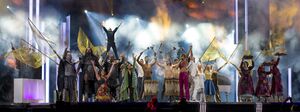Difference between revisions of "Eurovision Song Contest"
m (→Politics) |
|||
| Line 12: | Line 12: | ||
[[Georgia]] 's planned entry for the [[2009]] contest in [[Moscow]], [[Russia]], "We Don't Wanna Put In", a reference to the Russian president at the time. After requests by the [[European Broadcasting Union]] for changes to the lyrics were refused, Georgia's broadcaster GPB subsequently withdrew from the event.<ref>http://news.bbc.co.uk/1/hi/entertainment/7935865.stm</ref> | [[Georgia]] 's planned entry for the [[2009]] contest in [[Moscow]], [[Russia]], "We Don't Wanna Put In", a reference to the Russian president at the time. After requests by the [[European Broadcasting Union]] for changes to the lyrics were refused, Georgia's broadcaster GPB subsequently withdrew from the event.<ref>http://news.bbc.co.uk/1/hi/entertainment/7935865.stm</ref> | ||
| − | In 2015, Polina Gagarina represented Russia with her song entitled "A Million Voices". When the votes were given from each country, loud booing from the audience was heard whenever Russia was given points, and this made her cry.<ref>https://eurovisionni.wordpress.com/2015/05/24/russias-polina-in-tears-after-she-is-booed/</ref> Despite this, Polina finished in second place in the Grand Final, ending up with 303 points behind Sweden which won the contest with 365 points.<ref>https://www.mirror.co.uk/tv/tv-news/eurovision-2015-russia-gets-booed-5751214</ref> | + | In 2015, [[Polina Gagarina]] represented Russia with her song entitled "A Million Voices". When the votes were given from each country, loud booing from the audience was heard whenever Russia was given points, and this made her cry.<ref>https://eurovisionni.wordpress.com/2015/05/24/russias-polina-in-tears-after-she-is-booed/</ref> Despite this, Polina finished in second place in the Grand Final, ending up with 303 points behind Sweden which won the contest with 365 points.<ref>https://www.mirror.co.uk/tv/tv-news/eurovision-2015-russia-gets-booed-5751214</ref> |
| − | Complaints were levied against [[Ukraine]]'s winning song in [[2016]], "1944", whose lyrics referenced the deportation of the [[Crimean Tatars]], meant as a reference to [[Crimea]], a disputed peninsula held by [[Russia]]. | + | Complaints were levied against [[Ukraine]]'s winning song in [[2016]], "1944", whose lyrics referenced the deportation of the [[Crimean Tatars]], meant as a reference to [[Crimea]], a disputed peninsula held by [[Russia]]. The singer Jamala was the granddaughter of Crimean Tatars who had been deported to Central Asia. |
[[Russia]] boycotted the 2017 contest in [[Ukraine]]. Their candidate Julia Samoylova was banned from entering Ukraine, so Russia had to withdraw. | [[Russia]] boycotted the 2017 contest in [[Ukraine]]. Their candidate Julia Samoylova was banned from entering Ukraine, so Russia had to withdraw. | ||
Revision as of 04:53, 8 June 2021
 | |
| Location | Europe |
|---|---|
| Interests | Pinkwashing |
| Description | A yearly musical event held in Europe. |
The Eurovision Song Contest is an annual event held in Europe. The event has been extremely politicised recently, especially in the context of the New Cold War.
Politics
Georgia 's planned entry for the 2009 contest in Moscow, Russia, "We Don't Wanna Put In", a reference to the Russian president at the time. After requests by the European Broadcasting Union for changes to the lyrics were refused, Georgia's broadcaster GPB subsequently withdrew from the event.[1]
In 2015, Polina Gagarina represented Russia with her song entitled "A Million Voices". When the votes were given from each country, loud booing from the audience was heard whenever Russia was given points, and this made her cry.[2] Despite this, Polina finished in second place in the Grand Final, ending up with 303 points behind Sweden which won the contest with 365 points.[3]
Complaints were levied against Ukraine's winning song in 2016, "1944", whose lyrics referenced the deportation of the Crimean Tatars, meant as a reference to Crimea, a disputed peninsula held by Russia. The singer Jamala was the granddaughter of Crimean Tatars who had been deported to Central Asia.
Russia boycotted the 2017 contest in Ukraine. Their candidate Julia Samoylova was banned from entering Ukraine, so Russia had to withdraw.
Belarus was banned from competing in 2021. The Belarusian song was disqualified on grounds that the song was "too political".[4]
People
References
- ↑ http://news.bbc.co.uk/1/hi/entertainment/7935865.stm
- ↑ https://eurovisionni.wordpress.com/2015/05/24/russias-polina-in-tears-after-she-is-booed/
- ↑ https://www.mirror.co.uk/tv/tv-news/eurovision-2015-russia-gets-booed-5751214
- ↑ https://news.sky.com/story/eurovision-2021-belarus-banned-from-contest-as-song-deemed-too-political-12257869